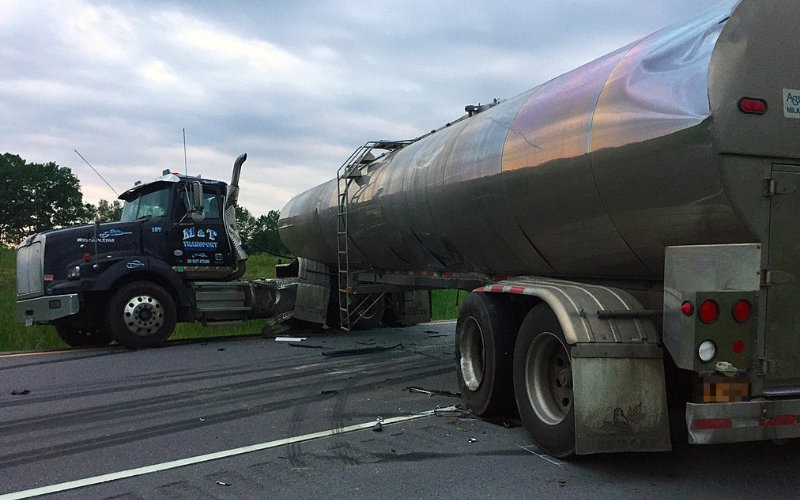As trucking fatalities rise, whistleblowers and other industry activists allege that trucking regulations are not working and the regulators are failing drivers. Andrew Gardiner with the story.
Deaths involving large trucks constitute 27% of all road fatalities in Australia, according to the latest report (June 2024) from the Department of Infrastructure, an increase from last year of 3.5% (12 deaths). Trucking industry whistleblowers claim regulators must take some of the blame.
Veteran truckie and Victorian beef cattle grazier ‘Witness 20’ (as they called him at the 2019 Senate’s Road Transport Inquiry) thought he was on to something when he made his road safety pitch to the Senate. He was alarmed at the number of what he called ‘up at the front’ suspensions and shoddy tyre installations – poorly placed and dangerous, but entirely legal – which could potentially cost lives.
“Trucks were rougher to ride and had much less driver road feel, which was especially alarming when cornering quickly or driving close to the verge,” said Witness 20, referring to road tests of ‘up at the front’ suspension set-ups in which air bag modules were high at the front end. “It wasn’t much of a difference (in height), but it was life-threatening when compared to properly configured systems,” he told MWM.
“What was very clear when leaning into a corner was the sideways rotation of the trailer, setting up a chain reaction that could be deadly.” He added:
Official trials were needed to confirm this, laws, regulations and their enforcement needed to change, and trucking companies had to toe the line.
However, after sympathetic hearings at the Senate inquiry and with state-based authorities like VicRoads (all of which seemed keen to move forward on his proposal). Witness 20 says he “hit a brick wall” in the form of the National Heavy Vehicle Regulator (NHVR) and the National Transport Insurance (NTI) group. “I had teleconference meetings with NHVR, and they brought in an expert from New Zealand, but all of a sudden, he declared ‘case closed’.”
Senate inquiry to nowhere
“Nothing’s happened in the five years since, save for a taxpayer-funded NTI study focusing on milk tankers, called ‘spilt milk’. They concluded the instability was caused by liquid loads sloshing around, but I’ve seen instability when trucks had a solid, stationary load, and it’s clearly a suspension issue,” according to Witness 20.
“Something happened after that first (NHVR) meeting, and I’m left wondering who gained from all the inaction,” Witness 20 concluded. There are three main manufacturers of suspension kits – BPW, Hendrickson’s and Kenworth Trucks – serving the Australian market.
Witness 20’s grievances and those of whistleblowers like Roxanne Mysko share common themes of lethargy, stonewalling and cosiness with trucking companies, insurers and manufacturers. “It seems like our regulators only spring into action on the part of truckies when there’s a death involved,” Roxanne said.
You’ve got to wonder why they’re there sometimes.
As trucking fatalities rise, the whistleblower finds herself under arrest
Criticism of NHVR
Criticism of NHVR, its funding and the powers at its disposal comes from many quarters. Trucking executive Ryan Howison from DSE Transport sees the aftermath of a deadly 2020 trucking accident in Melbourne’s east as illustrative of broader problems.
“NHVR laid charges against Connect Logistics in September 2021 (resulting in an unprecedented $2.31 million in fines) following an in-depth investigation by Victoria Police’s Taskforce Paragon, after a heavy vehicle tragically struck and claimed the lives of four police officers” who were booking a motorist, Howison wrote in transport newsletter Big Rigs. “The evidence established Connect Logistics had been breaching laws for ages – and it took the death of four police officers for this to finally come to light,” he pointed out (emphasis added).
In June, MWM published independently sourced claims of systematic safety violations at Port Adelaide-based Express Cargo Services (ECS). While MWM is not suggesting NHVR or ECS have acted unethically by violating or failing to enforce workplace or transport safety regulations, we note the contrast between the speed and dedication of NHVR’s response to a high-profile tragedy in which police died, and – according to sources – the regulator failing to take any meaningful action when two separate individuals associated with the trucking industry, Roxanne Mysko and Witness 20, came forward on their own and without the benefit of large-scale publicity.
Trucking deaths on the rise but safety whistleblower ignored then prosecuted
Howison believes that in its current form, NHVR has three major flaws:
- It rarely, if ever, shows up at a trucking company’s yard unannounced and cedes a lot of the enforcement work one might expect of it to police forces, state road authorities and state-based work health and safety authorities – with many of the latter stretched for resources as it is;
- It “cannot have heavy vehicle inspection stations everywhere” and:
- It “cannot enforce the way a company instils a safety culture within its workforce.”
His suggested solutions include stronger enforcement and inspection powers, the ability to elect or appoint “Heavy Vehicle Representatives” with the power to trigger an NHVR investigation for failure to comply with regulations, and giving drivers and other workers the right to stop work (without retaliation) if what they’re being told to do is not safe.
Many of these issues go to the resources available to NHVR, while others speak to a need for more regulatory powers. Still other claims, as yet unsubstantiated, could point to a preference for investigating higher-profile cases involving deaths and – some claim – a certain cosiness with trucking companies or (in Witness 20’s case) manufacturers.
NHVR and TWU responses
In a statement to MWM, the NHVR insisted it takes every incident involving a heavy vehicle seriously. “Whether the case is ‘high or low-profile’, we are committed to investigating every incident thoroughly,” the regulator’s Jesse St Ledger stated.
“While there is no requirement for the NHVR to provide advanced notice of our attendance, there is little advantage to be gained by attending unannounced in (most) circumstances.”

One of the primary issues plaguing road transport is the convoluted Chain of Responsibility (CoR) system. Image from Facebook.
Regulators aside, trucking companies and truckies alike say the laws governing heavy vehicles are themselves in urgent need of overhaul. The Transport Workers Union (TWU) has long raised concerns about a focus on what it calls “symptoms” (like poor and dangerous driving, blamed solely on drivers) over the “proven root causes” of accidents like companies cutting corners on safety (often under financial pressure from giant corporate customers) in violation of Chain of Responsibility (CoR) rules.
As reported by MWM, such corner-cutting has allegedly led to fatigue among drivers, said to have worked up to 26 days straight. The relevant law states drivers must have a 24-hour break every seventh day, but some say the law’s being routinely flouted.
“CoR as originally conceived was supposed to proactively reduce pressure (from big businesses at the buyer’s end of the supply chain) that lead to corners being cut,” TWU’s Emily Mead told MWM. “In reality, the law (remains) a reactive post-CoR-breach regime that ends up focusing enforcement activity on drivers and some operators.”
Trucking exec Howison agrees on the need for a proactive approach: “Companies can only implement significant structural changes and safety measures after (an accident) has already happened,” he wrote in Big Rigs. This means “preventable accidents can occur” in the meantime.
The ‘it won’t happen to us’ mindset prevails until disaster strikes.
Hopes for safety improvements
Fresh hope for trucking safety emerged last week with the addition of a road transport division to the Fair Work Commission (FWC). The TWU is confident this new body will “set enforceable standards to make the industry safe” as it can set safety standards “that apply to every participant in the supply chain, including retailers, manufacturers and oil companies at the top,” TWU’s Mead told MWM.
“During the first week of this legislation, the TWU submitted the first contract chain application to ensure fair payment terms and prevent financial risk being passed onto operators and drivers on razor-thin margins. With a new system to tackle those root causes, we hope to see NHVR take up the role of monitoring supply chains effectively … and making roads safer,” Mead concluded.
Of course, at this early stage, it’s unlikely such changes will immediately help Witness 20 and his now five-year-old submission on safe suspensions.
“I have to wonder whether improving suspension technology is an established part of the FWC’s purview,” he joked. “Maybe that’s a reform for another day.”
Editors note: MWM contacted NTI for its position on this story, but had not received a reply by publication time.
An Adelaide-based graduate in Media Studies, with a Masters in Social Policy, I was an editor who covered current affairs, local government and sports for various publications before deciding on a change-of-vocation in 2002.

